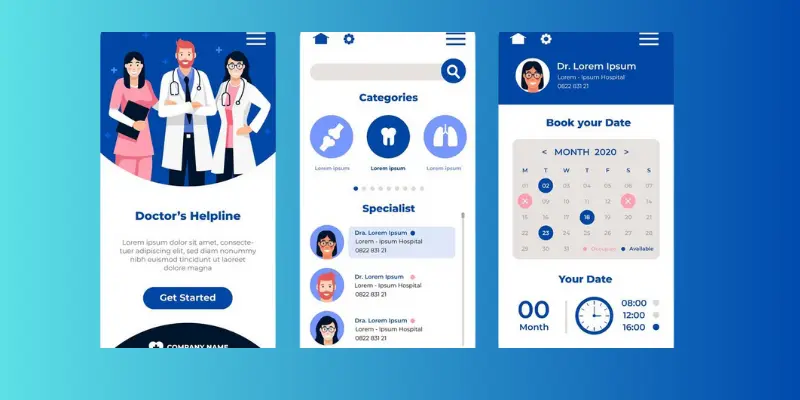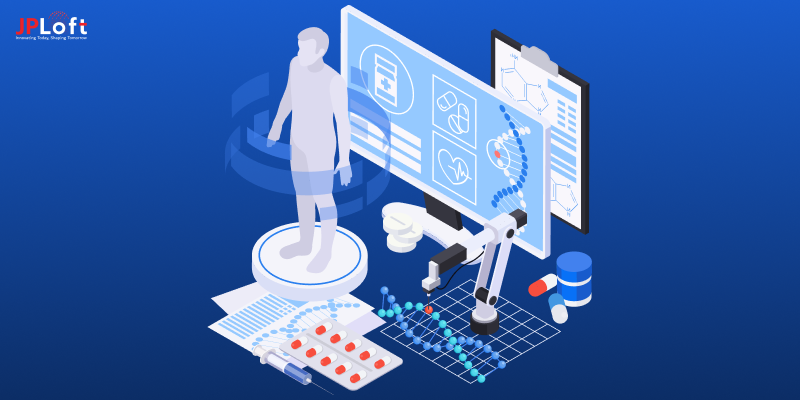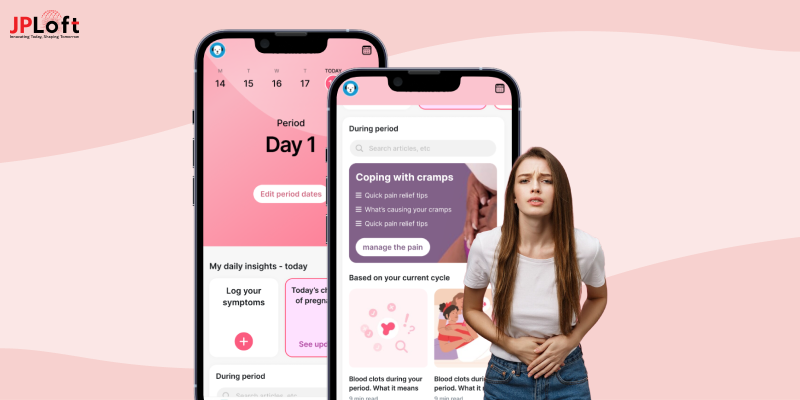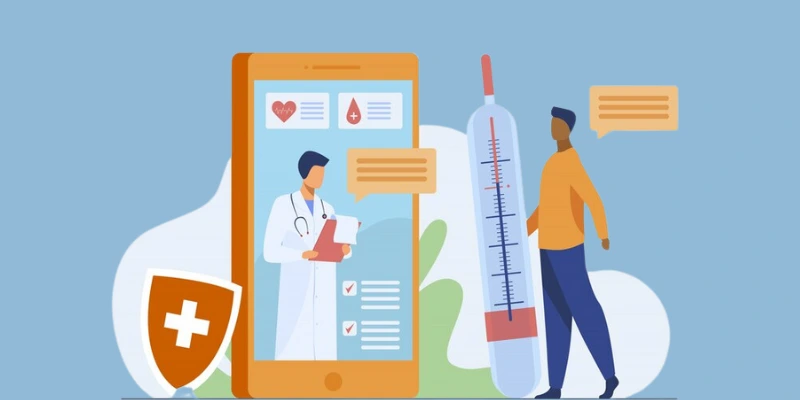Recently, AI and the health industry have seen new opportunities to change the concepts of medical diagnosis treatments, diagnosis, and care for patients. The growing amount of AI applications for healthcare is creating an entire map and offering new opportunities that could only be described as science fiction. The world's artificial intelligence market, the healthcare field, is predicted to expand at approximately 40.2%. The market is set to grow to $8,810 million in 2029. The development of the AI market in the healthcare AI market is staggering and highly significant.
AI usage in healthcare significantly affects how we carry out diagnostics and medical treatments. AI improves workflows, operations, and processes and automates repetitive tasks. It can also answer patient queries faster and offer personalized therapy plans and treatments. Artificial intelligence, the latest technological breakthrough, is transformative in Healthcare App Development Solutions. AI offers lightning-fast processing speed and precise accuracy.
Developers, also known as the human architects of app innovation, play an important role. Armed with their creativity and in-depth understanding of users' needs, they design the user interface. With their experience, they create apps that address real-world healthcare needs. Therefore, AI in healthcare app development can be profitable as it can benefit patients, researchers, clinicians, and healthcare professionals. This is why AI is emerging as an innovative technology that can aid in diagnosing diseases, cut down on the cost of healthcare, and transform treatment and prevention.
In this blog article, we'll talk about the future of AI-powered healthcare apps.
Let’s get it started.
Understanding Artificial Intelligence In Healthcare
Artificial intelligence (AI) is the science of computing that focuses on the development of intelligent machines. The field has had a significant impact on healthcare. AI's primary objective is to imitate human intelligence, which allows machines to take on tasks that require some cognitive capabilities, including thinking, learning, problem-solving, and making decisions.
AI analyzes vast amounts of clinical medical information within just a few minutes. These data could comprise patient charts, diagnostic imaging, medical notes, and research papers. The development of AI for healthcare is an intricate procedure involving various technological advancements that are transforming the system.
What Are Healthcare Apps?
Healthcare apps run on mobile devices or the web to provide a variety of medical and health aspects of care. They are designed to meet the needs of a wide range of patients, including patient education, medical management, health monitoring, and accessibility to health services.
The software and apps for healthcare can broadly be classified into various categories: Wellness apps focusing on nutrition and fitness and medical reference applications to aid healthcare professionals. These telemedicine apps enable remote consultations and apps for managing chronic diseases to help patients deal with diseases like hypertension or diabetes. The ease of managing health is unbeatable, making the procedure more accessible and less stressful.
With features that integrate the ability to track data in real-time, secure channels for communication, and personalized health information, mHealth apps play a crucial role in improving accessibility, efficacy, and the effectiveness of healthcare. Users are empowered to take active steps towards taking care of their health. They also provide medical professionals with tools that allow them to provide better care for patients. Healthcare has been dramatically simplified and synchronized by introducing healthcare apps and medical software for physicians and patients.
How Artificial Intelligence Benefits Healthcare App Development?
Physicians or doctors can streamline their workflows by incorporating artificial intelligence into the Healthcare App Development Services. They can provide top-quality patient care, maintain budget efficiency, and reduce the chance of human error. AI's potential within healthcare will revolutionize how healthcare providers provide healthcare.
-
Utilizing practical AI applications in healthcare and medical services will result in better risk predictions. This can result in 40% better results and a 50% reduction in cost.
-
AI applications for healthcare can make sharing data fast and easy, allowing for more accessible analysis and insight based on treatment data.
-
Artificial intelligence-based healthcare software processes vast amounts of information, aiding doctors and healthcare professionals in assessing disease risk factors, treatments, and programs with greater precision.
-
This technology revolutionizes how remote health facilities can reach patients through mobile devices. A more efficient and speedier appointment scheduling ensures that healthcare providers are present worldwide, even in rural regions.
-
Since health-related and fitness issues become more commonplace, keeping track of your vital signs, daily routine, and diet is crucial. When you visit your doctor, you can be sure to provide the most accurate data to your physician so any illness that could develop can be identified earlier.
-
AI applications in healthcare streamline the administrative process, including simple tasks. This leads to higher efficiency in hospitals and other providers of medical services.
-
Integrating AI capabilities into healthcare apps allows Patients to receive personalized treatment, which results in improved overall satisfaction.
-
The speedy data processing of AI health apps could assist in detecting and preventing disease, providing cost-effective solutions to patients.
Role Of AI In Healthcare App Development
AI has been recognized as a revolutionary technology in developing healthcare apps. It promises a future where AI technology will revolutionize patient healthcare, diagnosis, treatment, and much more.
Automated Code Generation
Artificial Intelligence tools like Generative Adversarial Networks or Reinforcement Learning through Human Feedback (RLHF) are successfully trained using massive code repositories, allowing them to identify patterns and structures inside them. They then learn to create codes or functions according to the requirements you provide, which significantly speeds up the initial steps of code writing, creating boilerplate or repetitive scripts.
Algorithm Design And Implementation
AI methods like machine learning and evolutionary algorithms help developers design and implement complex algorithms efficiently and swiftly. Genetic algorithms can optimize certain parameters specific to healthcare data processing and allow developers to tweak these systems to achieve the best performance.
Code Optimization
AI machines that use machine-learning algorithms can analyze code and identify areas that could be improved. For example, AI could identify better techniques, data structures, or memory usage patterns and suggest improvements to improve efficiency. AI can also identify and modify sections that may be prone to errors or aren't compliant with the most effective methods of programming language use.
Predictive Analytics And Decision Support
AI models, such as machine learning classifiers and regression models, analyze data from patient records. They use research papers to forecast a disease's outcome, suggest treatments, or offer assistance in making decisions based on previous patterns found in healthcare providers' records. The analysis could help predict disease outcomes or provide aid based on historical trends and patterns to assist healthcare providers in making better-informed choices.
Chatbots And Virtual Health Assistants
AI-powered chatbots use NLP and ML to imitate human-like conversations. They analyze user inquiries to determine intent and then provide the appropriate response. The reinforcement learning process can allow chatbots to improve their response over time, resulting in better virtual health assistance.
Medical Imaging Analysis
AI and deep learning designs explicitly, such as Convolutional Neural Networks (CNNs), can be honed on large medical imaging data sets. The AI model is trained to identify patterns within images. This aids in the automatic detection of abnormalities like tumors and fractures. It can also assist radiologists with their diagnosis.
Natural Language Processing (NLP)
AI-powered Natural Language Processing tools leverage deep learning algorithms to rapidly analyze and extract valuable information from a huge amount of medical research literature. Named Entity Recognition (NER) aids in identifying medical terms like drug or disease, and sentiment analysis analyzes the thoughts and opinions in research papers on medical subjects for deep and precise analysis.
Testing Automation
AI can automate testing by creating scripts to generate test scenarios, replicate the user's interactions, and detect bugs. AI algorithms can also prioritize test cases according to the potential for impact or commonly used tools. It improves the test process while ensuring the security and stability of healthcare applications.
AI Technologies In Healthcare App Development
.webp)
AI is used in healthcare, and related fields have become more commonplace than ever. Technology is evolving in many ways, such as guiding researchers in their research, streamlining administrative processes, and many more.
We will look at different types of AI technology that can be used for mHealth App Development.
Natural Language Processing (NLP)
By combining speech recognition, text analysis, and the ability to translate, NLP understands human language or data gathered in formats other than numbers. Health apps utilize NLP to understand and categorize clinical information and research data in reports, notes, and other documents and help customers by providing conversational AI.
Machine Learning And Deep Learning
Machine learning (ML) is among AI's most frequently discussed technologies. It deals with training models based on information. Neural networks and deep learning are the ML methods utilized for medical research and predicting results. A standard ML method used in healthcare applications is training datasets that are most likely to be successful for accuracy in medicine, i.e., indicating the treatment plan and other plans.
Predictive Analytics
This field combines ML and AI in healthcare to identify patterns and connections in information to forecast future outcomes. Doctors, clinicians, and other specialists use this technology to find treatment plans in light of the signs. Furthermore, it will detect when clinics and hospitals are jammed to provide upcoming appointments, improve availability, and improve staff placement.
Speech Recognition
In AI, speech recognition technology can convert human speech into a format for writing so that data is not manually entered. AI healthcare programs allow conversational AI to reduce manual work and human errors by reducing time and effort.
Robotics Process Automation
Automated process automation (RPA) employs computer software running on servers that follows rules or scripts to automate workflow and make the system more intelligent. Health-related apps utilize RPA to automate administrative routine tasks like updating patient records or authorization, improving operations efficiency and productivity.
Rule-Based Expert System
These are the typical "if-then" practices that are used in the field of healthcare for medical decision-making. The system was based on human knowledge and rules to be developed. It is, however, slow and prone to a risk of causing rule conflict; this approach has been replaced with better methods of ML and algorithmic approaches.
Steps To Develop AI-Enabled Healthcare Application
Focusing on the interaction between humans and healthcare, we create strong AI applications for healthcare that surpass your expectations. Here are the steps to creating a simple medical application built with AI.
Design And Develop AI Solutions
Utilizing the strengths of technology strategy, operational, and strategic knowledge, we provide user-focused analysis to pinpoint obstacles, milestones, and metrics for success. When we look at the standards and issues, we contextualize the algorithms to deliver appropriate results to the end users.
Evaluate And Validate The Predictions
The next step is to evaluate the forecasts generated by the system to determine what works and what does not. This is then a test of the system's resilience in terms of accuracy, stability, and performance in real-time in a dynamic context and the value of an investment in terms of cost.
Scale-Up AI Systems
The next phase involves changing the model to adjust to the increasing volume of data and the number of users. As we scale up AI models, we increase their impact to ensure they can continue delivering value to more users.
Monitor And Maintain
Ultimately, the last step includes monitoring and maintaining the AI systems to ensure continuous performance, reliability, and importance. The system is monitored and addressed to improve its performance and address any issues during real-world situations as they occur. We also upgrade AI algorithms to ensure regular maintenance and provide responsiveness to create a reliable AI health application that has long-lasting value.
AI Vs. Developers In Healthcare App Development
In this section, let’s understand the role of AI and Hire Healthcare Mobile App Developers in healthcare app development.
Understanding Complex Healthcare Needs
-
AI processes and analyzes vast healthcare data to discover patterns and insights. However, it needs to have the depth of understanding and sophisticated understanding of healthcare complexities that human experts have.
-
Developers with technology and healthcare skills are essential in interpreting AI-generated information. They know complex health needs and can translate AI insights into concrete, actionable solutions that meet the industry's demands.
Decision-Making And Expertise
-
AI provides valuable information. However, it lacks the experience, expertise, and judgment that medical professionals and developers can bring.
-
Developers collaborate closely with healthcare experts, combining AI-generated insight with domain-specific expertise and expert-level validation. Human-AI partnerships ensure that the app's recommendations and decisions are reliable, accurate, and by the highest industry standards.
Customization And Adaptability
-
AI can provide standardized solutions based on a training algorithm and data. However, it might struggle to adapt to the specific requirements that differ across healthcare applications and organizations.
-
Developers are adept at customizing solutions to meet the ever-changing demands of health professionals and patients. They design and develop unique functions and features, ensuring the application effortlessly integrates with every healthcare facility's unique procedures and workflows.
Ensuring Data Privacy And Compliance
-
AI algorithms require careful guidelines and supervision to ensure they align with the strict privacy requirements of healthcare rules such as HIPAA. The developers are crucial in ensuring AI works within these legal guidelines.
-
Developers develop AI with a solid system of conformity. They create and design the AI components in a way that adheres to the stringent data security and privacy regulations required in the healthcare field. Their experience ensures that delicate medical information is protected and compliant with the various laws.
User Experience And Interface
-
AI analyzes data and provides information; however, it often depends on developer intervention to build an easy, user-friendly interface that enhances user experience.
-
Developers collaborate with designers to improve AI-generated outputs and develop an easy-to-use interface. They are focused on creating a user-friendly and enjoyable experience and ensuring that patients and healthcare professionals can interact easily with the program to reap the most benefits.
Innovation And Progress
-
AI operates within the limitations of its algorithms and learning data. It is not able to develop beyond its limits without human oversight.
-
Developers drive innovation in healthcare app development. They're on the cutting edge of the search for new technology, frameworks, and methods. The constant pursuit of innovation improves the functionality of healthcare apps, providing innovative solutions while keeping ahead of the curve in an ever-developing healthcare industry.
Troubleshooting And Maintenance
-
AI cannot detect and fix difficulties within the system or program. Human intervention is required to resolve issues.
-
Hire Healthcare Software Developers who can identify and fix issues that might occur and ensure that the software runs smoothly. Their attention to detail and experience help them improve the software and adapt it to the changing needs of healthcare and technological advances.
Use Cases Of AI In Healthcare App Development
The estimated $265 billion in healthcare services will move from conventional facilities to home-based ones by 2025. This is a huge opportunity to provide rapid and efficient medical care. Thanks to technological advances in the health sector, including the latest generation of healthcare apps developed by the firm, it's all possible.
Artificial intelligence and healthcare assist in a variety of medical procedures and procedures, which help satisfy the demands of workforces, improve the patient's experience and reduce expenses. There are many applications for AI for healthcare app development, including:
Radiation Therapy
Health apps gather patients' EHRs to optimize radiation treatment for cancer patients. AI analyzes old medical documents to allow healthcare professionals to make more informed decisions on radiation doses while protecting healthy cells and increasing the treatment's effectiveness and safety.
Medical Imaging Analysis
Through medical imaging analysis, AI apps allow healthcare experts such as cardiologists or radiologists to examine MRIs, X-rays, and scans precisely and promptly. They can identify abnormalities, diseases, or anomalies while avoiding scan errors and providing accurate diagnostics.
Genetic Medicine
One of the more advanced applications of AI technology in healthcare is the development and discovery of treatments for genetic diseases. AI analyzes genome-related data sets and pinpoints any changes that could cause disease, which permits healthcare service professionals to personalize patients' treatment plans.
Administrative Applications
Administrative AI health applications streamline routine operational duties of hospitals, clinics, or other healthcare facilities. These include allocating resources and appointments according to doctor availability, calculating bills, and managing patient records, among other tasks.
Patient Engagement
AI is used in healthcare applications to increase patient involvement in adopting advanced health solutions and making informed health decisions. Features like reminders, personalized health information, and personalized content increase patients' satisfaction.
Diabetic Retinopathy Screening
AI Healthcare apps could serve as cost-effective diabetes retinopathy detection tools, helping to prevent the early onset of blindness for diabetics. They analyze retinal images to detect more-than-mild diabetes retinopathy, which is, more simply, the first sign of eye diseases caused by diabetes.
Pathology
Thanks to AI and ML, Healthcare professionals can analyze reports, medical images, or other documents and help find anomalies during the examination. The doctors can then provide accurate diagnoses.
AI-Driven Drug Discovery
This artificial intelligence-driven system combines data science, biology, and chemistry capabilities to analyze drug molecules' traces by determining their mechanisms and toxic effects. The revolutionary software displays remarkable accuracy in reimagining how pharmaceuticals are made.
Virtual Assistants And AI Chatbots
AI's most popular use cases in healthcare are developing or integrating virtual assistants or chatbots powered by AI into applications. Through conversational AI, this feature allows patients to make appointments or inquire about health-related issues. Healthcare providers can update doctors' availability and medical records rapidly.
Automation And Ambient Clinical Intelligence
AI healthcare applications process audio recordings of patients via a virtual chat to create clinical notes. They use automated speech recognition (ASR), natural language processing (NLP), and deep neural networks (DNN) to enhance transparency in the system and make decisions. Additionally, they automatize routine clinical processes and tasks to provide greater efficiency in patient care.
Key Considerations When Developing AI-Driven Healthcare App
Despite the significant advancements made in recent decades, the application of AI for clinical use is restricted and faces many obstacles. This is why you should consider a variety of factors when developing your personal-centered AI applications for healthcare, such as patient workflows, patient needs, security, trust, and ethical considerations.
Regulatory Compliance
Various healthcare regulations, such as HIPAA, HITRUST, and GDPR, must be adhered to to ensure the application complies with ethics and laws.
Data Privacy And Security
Data security and privacy in AI-driven health applications are crucial for protecting patient data and ensuring secure data transfer.
Ethical Considerations
Ethics, responsible practice, regulations, and safety are among the main issues encountered when using AI-driven applications in healthcare. So, hiring an expert Healthcare App Development Company that addresses these concerns and integrates transparency into decision-making is essential.
Accuracy And Reliability Of AI Models
Another challenge is generating exact and accurate results using AI applications for healthcare. AI models must be meticulously developed and tested to increase performance and eliminate mistakes or inaccurate recommendations.
Integration Into Existing Healthcare Systems
In some instances, the healthcare system already exists, and AI technology has to be incorporated to boost its performance and capabilities. Integrating AI-enabled health apps with current healthcare systems is essential for interoperability and data exchange.
AI In Healthcare: The Future
AI can transform diagnostics and treatment across various levels of the value chain. AI algorithms can precisely analyze medical imaging to assist medical professionals in identifying ailments. AI-powered devices also accelerate histopathology slide analysis, improving diagnosing precision. In addition, AI models leverage individual history and data to anticipate disease outbreaks and design individualized treatment strategies in response to genetic information and clinical and lifestyle aspects.
Although much research is being conducted regarding the use of AI in the development of healthcare apps, it is clear that there is plenty of potential for this area, which is still to be discovered. We need to understand how apps for healthcare can be improved with AI potential over the next decades.
Medical Precision
AI in developing healthcare apps allows professionals to create precise and personalized diagnoses and treatment suggestions. Healthcare's future promises higher-quality treatments and improved patient results, with an astonishing improvement in medical care precision.
Wearables And Sensors
The future of AI healthcare apps will rely heavily on wearables and sensor integration to track vital indicators such as activity levels, blood pressure, and other health-related indicators. AI algorithms will be able to analyze information in real-time. They will allow early identification of warning signs and risks and enable patients to get rapid medical attention.
Drug Discovery
AI is expected to transform drug discovery in the next few years, accelerating the development of innovative medicines. Thus, increasing numbers of healthcare companies could find solutions to various ailments and diseases.
Reduce Cost And Complexities
AI-driven technologies are predicted to decrease the expense and complexity of healthcare delivery. Alongside accurate diagnosis and individualized treatments, AI solutions will be meticulously optimized to improve healthcare delivery, eliminating complexities and making it cost-effective.
Conclusion
The role played by artificial intelligence in healthcare app advancement is fast-changing the healthcare industry. AI-powered healthcare apps enhance patients' healthcare by providing personalized intervention and individualized treatment strategies. It is essential to recognize that healthcare application development poses particular challenges to artificial intelligence.
AI lacks the depth of knowledge required for this delicate area, making humans indispensable. Developers' deep understanding of complex healthcare issues helps them bridge the gap between AI's possibilities and real-world healthcare requirements.
As the need for new health solutions increases, it is essential to join forces with an AI application development firm specializing in health app development. Incorporating AI in developing healthcare apps will open up endless possibilities to transform healthcare and enhance the patient experience.














Share this blog